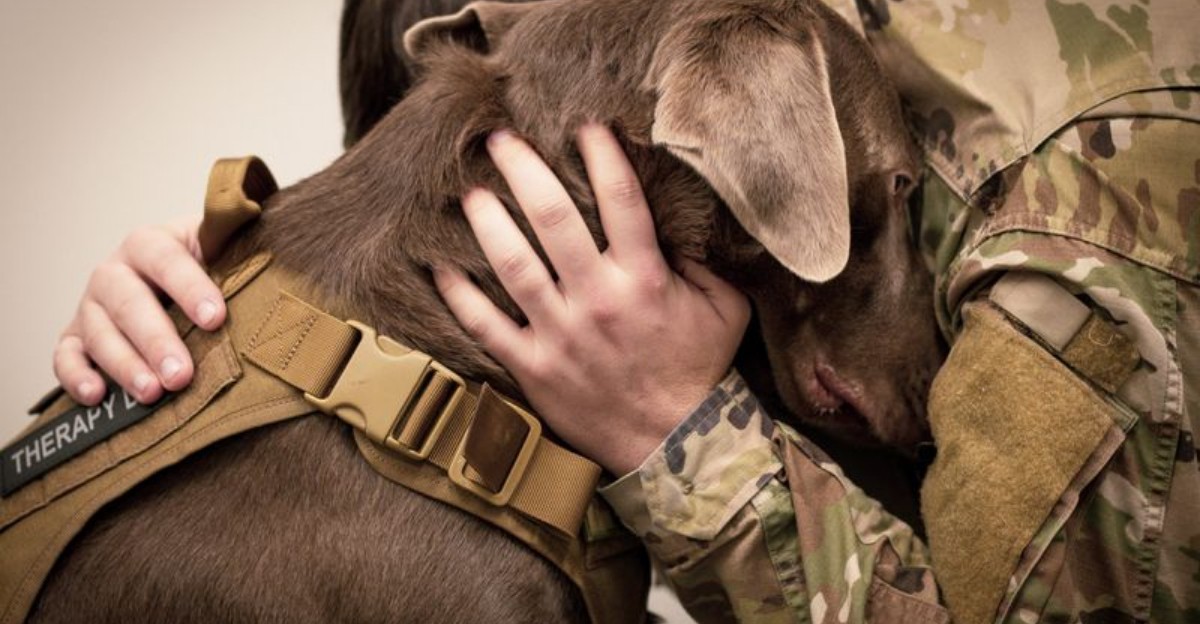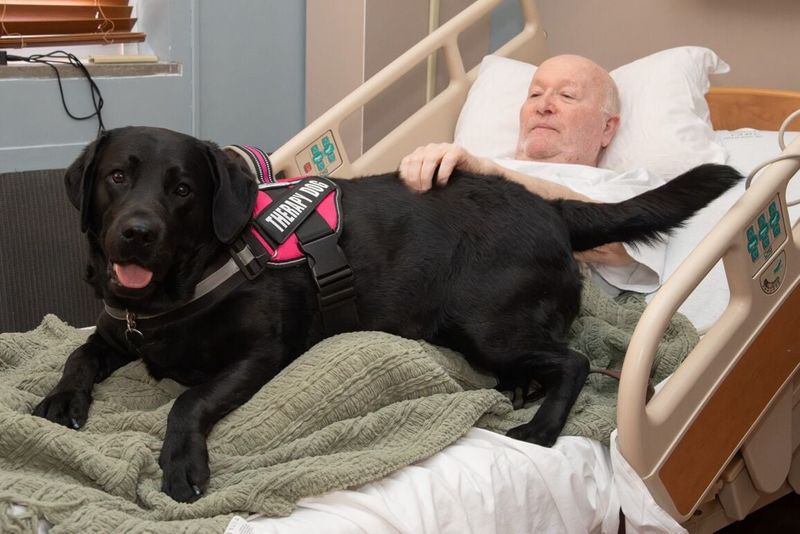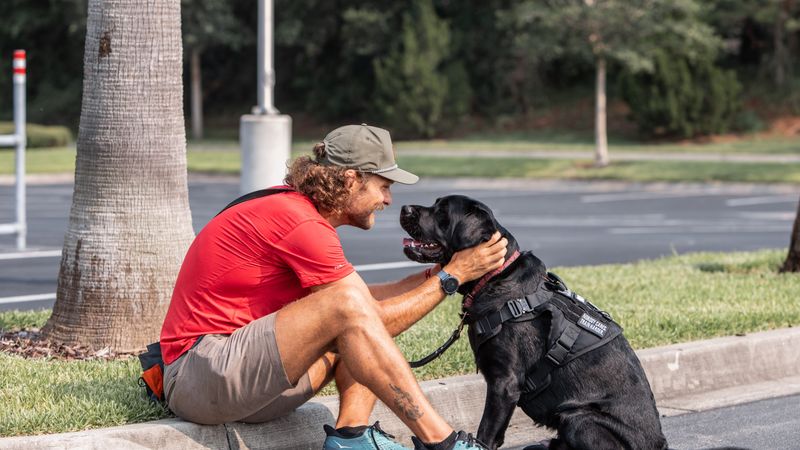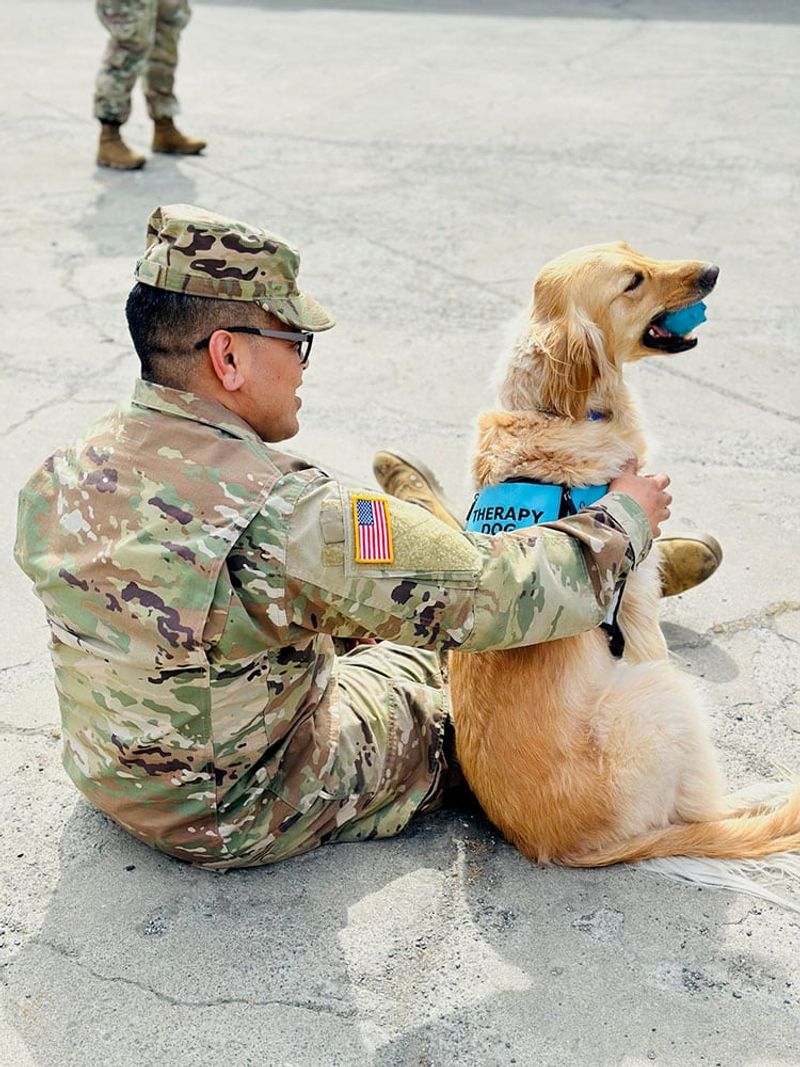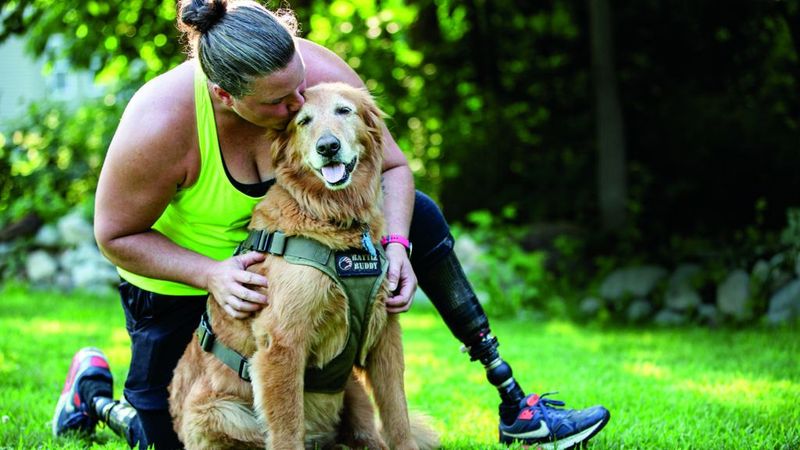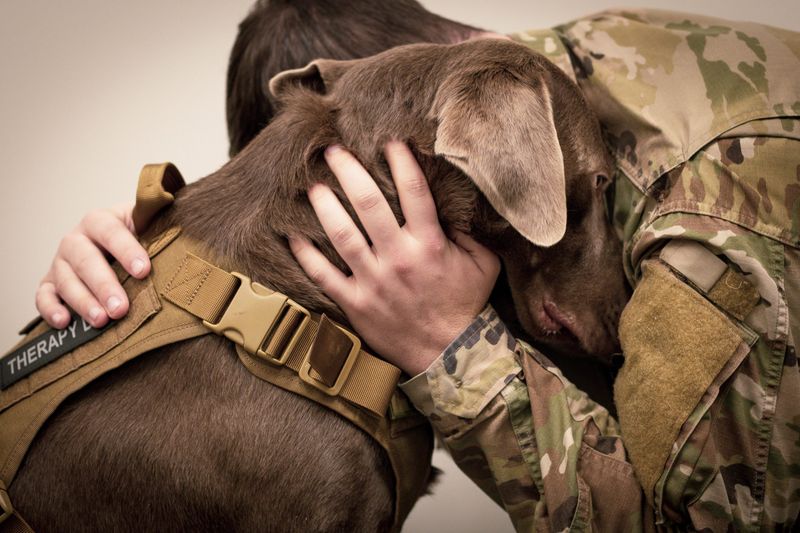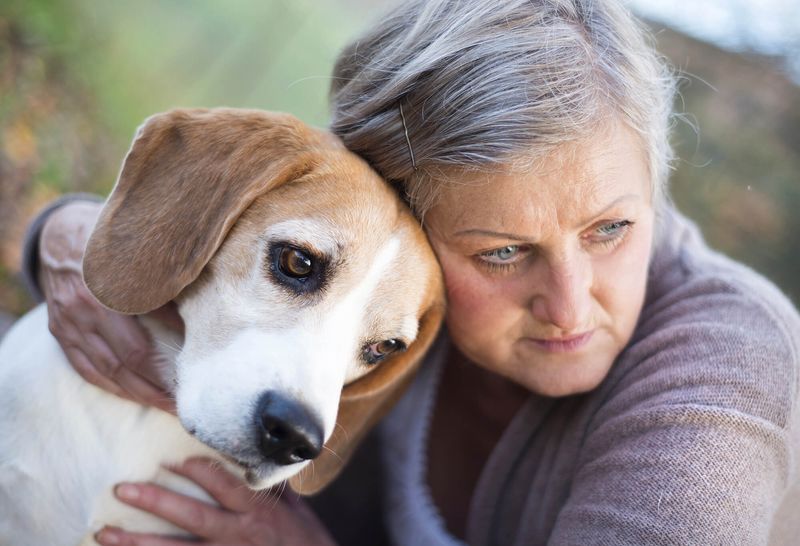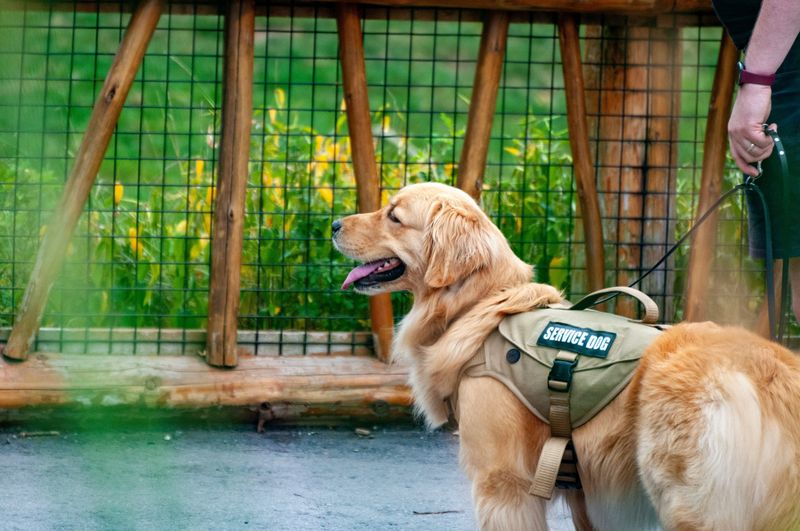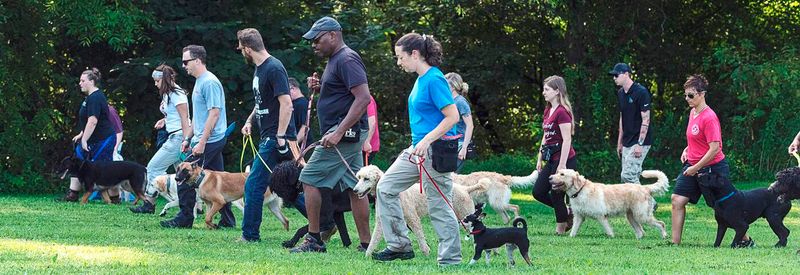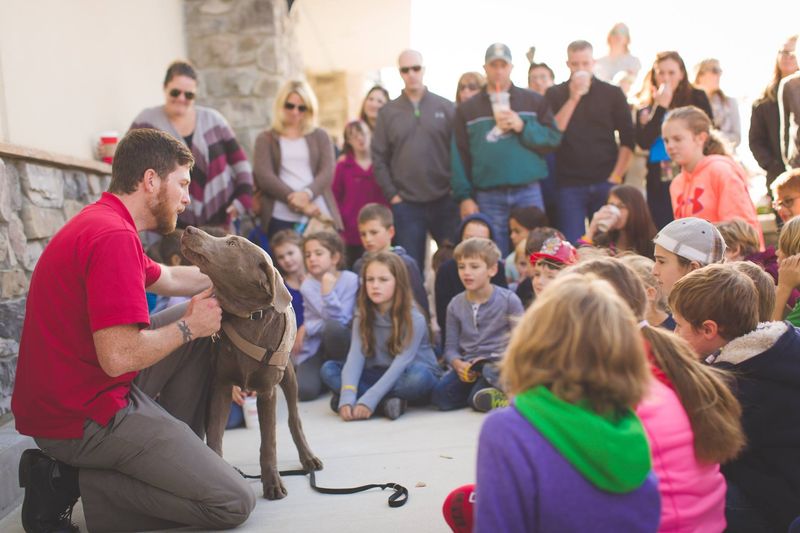Across the United States, dogs are transforming the lives of veterans suffering from PTSD. These loyal companions provide emotional support, companionship, and numerous therapeutic benefits. Integrating dogs into veterans’ lives can improve mental wellness and overall quality of life. Here are 10 ways dogs are making a difference for veterans with PTSD.
Therapy Dogs in VA Hospitals
In VA hospitals, therapy dogs bring comfort and emotional relief to veterans. These trained animals help ease anxiety, boost morale, and create a warm environment. Veterans often find solace in the gentle presence of a therapy dog.
Interacting with these dogs can lower stress levels and encourage social interaction among patients. The unconditional love provided by a therapy dog often alleviates feelings of isolation.
A comforting paw or a friendly nuzzle from a dog can be a turning point in a veteran’s healing journey. Therapy dogs are making impactful strides in mental health care.
Service Dogs for Daily Assistance
Service dogs are vital allies for veterans managing PTSD daily. These canines are trained to perform tasks that help alleviate anxiety and panic attacks. A veteran might rely on a service dog to remind them to take medication, or to wake them from nightmares.
These dogs are not just helpers; they’re companions that help restore independence. With a service dog by their side, veterans often feel more secure and confident venturing into crowded or stressful environments.
They offer stability, acting as a calming presence that helps mitigate PTSD symptoms effectively.
Emotional Support Dogs at Home
Emotional support dogs provide companionship and comfort to veterans dealing with PTSD in their homes. These dogs are not trained for specific tasks, but their presence can significantly improve a veteran’s mental health.
Such dogs offer unwavering companionship, reducing feelings of loneliness and depression. Their loving nature encourages veterans to open up and express emotions more freely.
Having an emotional support dog can also enhance a veteran’s daily routine, giving them a sense of responsibility and purpose. These dogs play an essential role in personal recovery and emotional well-being.
Companion Dogs in Group Therapy
Companion dogs in group therapy settings provide a unique way for veterans to connect and share experiences. These dogs act as neutral participants, helping to break the ice and foster communication among group members.
Their presence can ease tension and make veterans feel more comfortable in expressing their emotions. The dogs’ playful antics often bring smiles and laughter, offering a light-hearted break from serious discussions.
By providing emotional support, these dogs help create a supportive and empathetic environment conducive to healing and camaraderie among veterans.
Dogs in Recreational Therapy Programs
Dogs involved in recreational therapy programs offer veterans an active way to manage PTSD. Activities like hiking, playing fetch, or simply walking a dog encourage physical exercise, which is beneficial for mental health.
These activities also provide a sense of normalcy and routine, crucial for veterans struggling with PTSD. The bond formed during such activities helps strengthen trust and companionship.
The joy of engaging in fun, outdoor activities with a dog can bring about a sense of achievement and enhance overall well-being, making it an effective therapeutic approach.
Canine-Assisted Mindfulness Sessions
Mindfulness sessions involving therapy dogs provide veterans with an opportunity to practice relaxation and presence. The calming influence of a dog can enhance the benefits of mindfulness practices, helping veterans focus and manage stress.
Dogs are attentive listeners, offering a serene presence that encourages veterans to remain grounded. This practice can reduce symptoms of anxiety and depression commonly associated with PTSD.
Participating in such sessions can also improve emotional regulation and resilience, promoting a healthier mental state. Therapy dogs play an integral role in these transformative sessions.
Dogs in Art and Music Therapy
Incorporating dogs into art and music therapy sessions offers veterans a creative outlet for expressing emotions. The comforting presence of a dog can inspire creativity and provide a soothing influence during the therapeutic process.
Dogs can act as muses, encouraging veterans to explore new forms of self-expression. The non-judgmental companionship of a dog can help veterans feel safe while exploring difficult emotions through art or music.
These therapies can reduce stress and provide a sense of accomplishment, enhancing emotional healing and personal growth for veterans.
Dogs in Equine Therapy Programs
Dogs complement equine therapy programs by providing additional comfort and support. These programs offer veterans opportunities to engage with animals, fostering trust and empathy.
The presence of dogs in equine therapy can help ease initial apprehension and build confidence. Working with both dogs and horses offers a multifaceted therapeutic experience.
This unique combination supports emotional healing and reinforces the therapeutic benefits of interacting with animals. The collaborative atmosphere in these programs encourages veterans to develop new coping skills and emotional resilience.
Dogs in Educational Workshops
Educational workshops featuring dogs provide veterans with knowledge and skills to manage PTSD. Learning about dog behavior and training can be empowering, offering veterans new ways to connect and communicate with their canine companions.
These workshops encourage active participation and interaction, fostering a sense of community and understanding. Veterans learn practical skills that can be applied in daily life, enhancing their relationship with their dogs.
The workshops also serve as a platform for socialization, helping veterans build supportive networks. Dogs facilitate these interactions, making the learning experience enjoyable and beneficial.
Community Dog Events for Veterans
Community dog events bring veterans together, offering opportunities for socialization and engagement. These events often feature dog shows, training demonstrations, and fun activities for all participants.
Attending such events helps veterans connect with others who share similar experiences and interests. The presence of dogs creates a relaxed and welcoming atmosphere, encouraging interaction.
These gatherings promote a sense of belonging and camaraderie, vital for veterans dealing with PTSD. Participating in community events with dogs can enhance social skills and build strong, supportive relationships.
